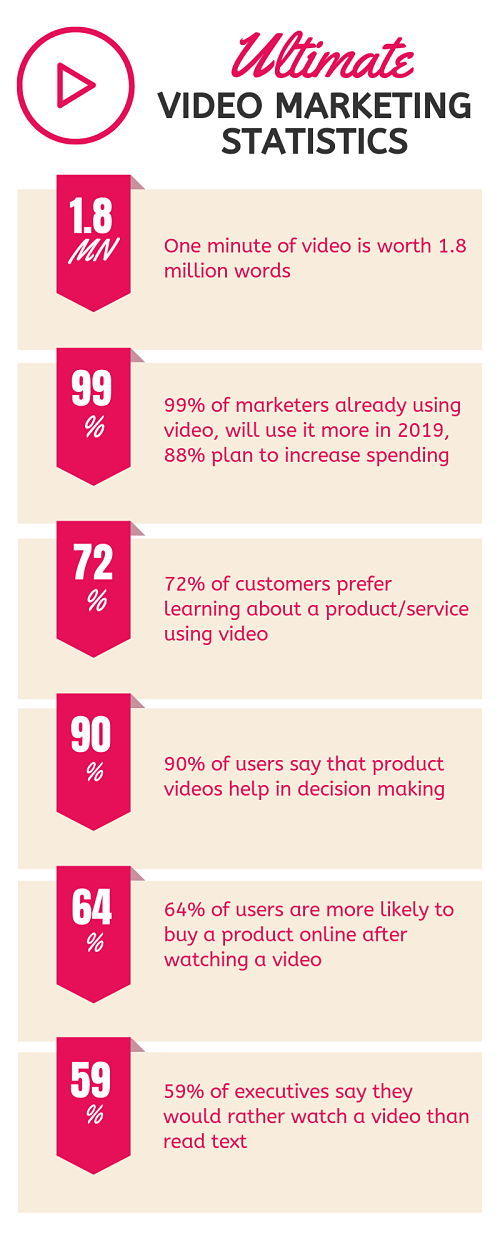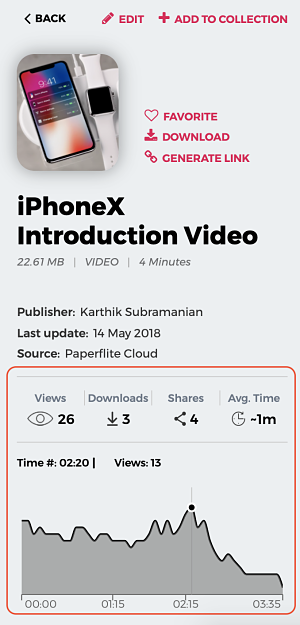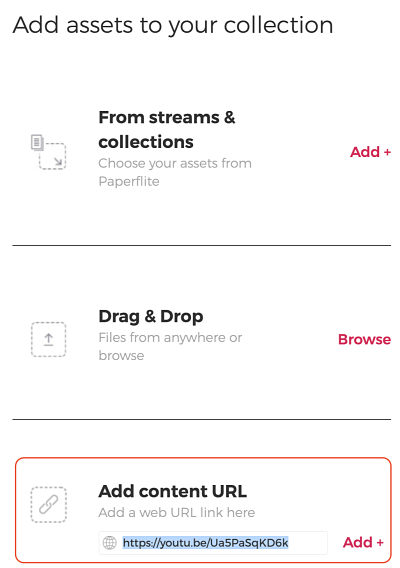Video Analytics: Helping Sales and Marketing teams strategize content
Video analytics enables sales & marketing teams to discover, create and share contextual videos, and measure its success.
WHAT IS VIDEO ANALYTICS?
Video analytics provides marketing and sales teams with a complete view of how their leads and customers are engaging with their videos. It gives you data about their preferences, usage patterns, bounce rates, etc.
When was the last time you saw a video? 10 minutes back? An hour ago? We'd not be surprised if you got here right after watching a video.
As the following infographic indicates, videos are a type of marketing collateral.

“As humans, we are wired to absorb stories, and videos can teleport us into the narrative faster than mere text.”
They are not a fad— they are here to stay. Videos engage two senses, eyes and ears, unlike reading that involves just one.
We find movies, ads, and games that we've watched more memorable than books or pamphlets that we've read.
Considering how videos naturally appeal to us, it is of no surprise that about 500 hours of videos get uploaded on YouTube by the time you finish reading this blog. This number keeps increasing every year.
Revenue from video ads is expected to touch $103 billion by 2023 as YouTube continues to have more users, becoming a hotbed of potential customers. The popularity and flexibility of this medium make it vital to a company's marketing strategy.
VIDEOS IN SALES & MARKETING AND THEIR ROI
Sales and marketing teams can use videos to do a wide range of tasks. Salespeople use videos to:
- Convince customers/prospects to buy their products/solutions
- Demonstrating how a product works (product walkthroughs)
- Educating leads about how to find answers to their problems
- Onboarding customers into their fold
- Showcase customer testimonials as proof of success
Marketers use videos to:
- Train sales teams about new product launches/features
- Enable sales teams to make effective pitches
- Exhibit their solutions during conferences, roadshows, events
- Enhance their organization's brand image
- Improve conversion rates of their website visits
Every video has its hit and miss rate. Measuring the ROI of video content would inform marketers and sales teams on shareable content. To accurately measure it, they need to be armed with the necessary insights. Here is how a marketer thinks about their videos:
- Are our sales teams using videos that we've put together?
- Do our customers like watching our videos?
- What should be our theme for the next video?
Meanwhile, a sales rep is left wondering after a sales pitch about:
- How do I track user engagement with our company's videos?
- How do I know the right kind of videos to nurture my prospects?
- My next meeting with a prospect is two days away. How do I begin my conversation?
VIDEO ANALYTICS: USE CASE FOR SALES TEAMS
Andrew is a sales rep at a manufacturing company and uses videos in his email campaigns to communicate features about his product to customers. In one such campaign, he used a video to show his customers the benefits of using his product's latest features to shorten production time, improve yield, and reduce wastage.
Andrew can uncover exciting insights via video analytics, such as:
- Total time spent by every customer on a video
- Time spent across each frame (including multiple views)
- Exit points for users in a video
- Number of views across each a video's entire duration
VIDEO ANALYTICS: USE CASE FOR MARKETERS
Jennifer is an event marketer who visits conferences to exhibit how her product could solve customer challenges. She uses an iPad at her booths to interact and share videos with customers. However, she struggles to know pre-event and post-event marketing metrics for her videos.
Jennifer can discover powerful insights using video analytics that include:
- Finding the appropriate video to be shown to prospects (pre-event)
- Average time spent on a video (pre-event)
- Number of people who've watched her videos (post-event)
- Number of times her videos have been downloaded (post-event)
- Number of times her videos have been re-shared (post-event)
Video analytics software can convert such disparate and difficult-to-organize data into ideas, trends, statistics, and insights via smarter techniques.
Also Read: Effective ways to manage your digital assets in iPad
VIDEO ANALYTICS SOFTWARE: HOW DOES IT WORK?
Instead of trying to gather data on individual videos and deduce their performance, Andrew and Jennifer can use content management systems such as Paperflite. Videos or other sales and marketing collaterals can be stored and sorted according to the situation. The engagement rate and viewing time are directly tracked and displayed by Paperflite for every content piece. Now, Andrew and Jennifer find the appropriate videos to readily share with their customers.
Get Granular Information About Every Content Being Sent
The below screenshot shows how a user can search for a video in a content management system.

Clicking on a video will reveal its vital analytics such as views, downloads, re-shares, and the average time spent on it.

In a nutshell, video analytics can tell a marketer or a sales rep how popular a video is, making it easy for them to learn which ones are working and are worth sharing with prospects.
But, what if a user wants to add a YouTube video?
Content management systems like Paperflite enable marketers and salespeople to import YouTube videos without downloading them. All that they need is a YouTube link that can be imported and hosted, whose performance will be measured as well.

And, remember to use a free YouTube thumbnail maker to get more views for your videos!
SUMMING IT ALL UP
Videos have the potential to extend a company's brand awareness and improve its bottom line.
For marketers, video analytics helps quantify the returns on their video marketing, making it easy to build the business case for producing more of it. Sales teams can leverage video analytics to find the most contextual video for their customers, use it to engage customers in a meaningful way.
Overall, video analytics enables executives to chart future roadmaps for their business based on discovered trends.
